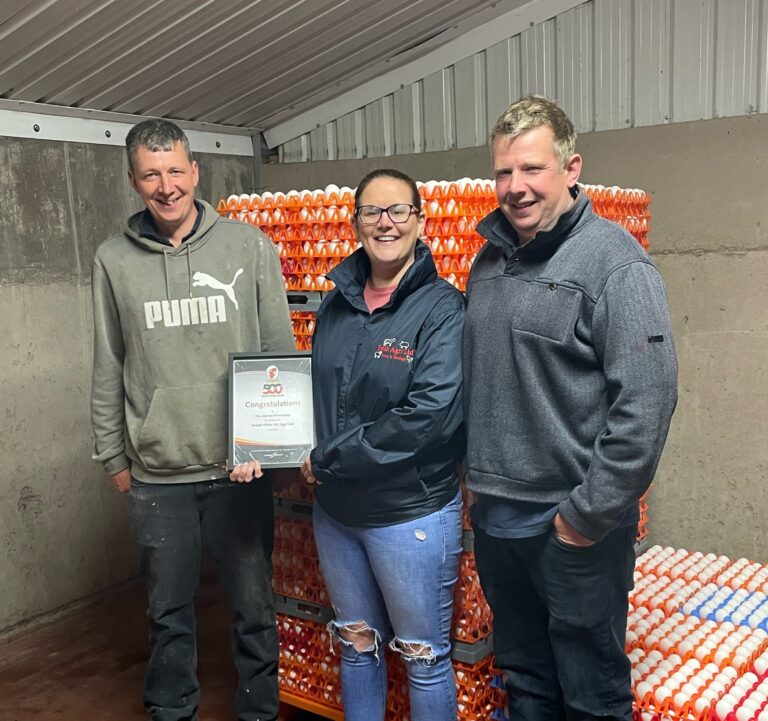Janet and Andrew Abberley first decided to diversify into poultry in the early 2000s, after the foot & mouth outbreak.
Although they weren’t directly hit themselves, the mass cull across the country prompted them to reduce their dependence on cattle at the Abberley Partnership, their family farming business near Llandrindod Wells, Powys.
Up went their first 12,000 bird flat deck house, and they moved into laying hens for the first time.
Today the business is headed up by Janet and Andrew’s two sons Ross and Roger, and is a true family affair, with spouses Zara and Fiona and their children, all active in the business.
“We initially chose a full end-to-end contract with Bowler, starting with brown birds,” says Zara Abberley. “Bowler had a high profile at the time, and we knew a lot of people in the area were working with them. For a new enterprise the end-to-end deal provided advice and services for the full set up and support including planning, build, feed, pullet rearing, technical, IT and financial performance.”
In 2011, the farm was damaged in a fire and with the help of a Processing and Marketing Grant (PMG) grant funded through the Rural Development Plan for Wales, the Abberley Partnership expanded its business by adding facilities for a further 12,000-bird flock, doubling its output of free-range eggs. The PMG funding also helped to pay for the purchase and installation of equipment to process an additional 3.2 million eggs a year.
The Dekalb White
As the business grew, it began to consider doing things differently. “As our confidence and experience of managing free range flocks grew, we began to look at other breeds,” says Zara. “We were working with Humphrey Feed and Pullets at the time and had excellent field support from Gwenda and Colin. We trusted them and when they suggested white birds, we were happy to put our faith in white eggs. We now have 48,000 Dekalb White layers, in three multi-tier houses.”
“We opted for the Big Dutchman system and have found their service to be excellent – it is more money, but better for the hens and the eggs. The system is easy to understand for the layers, they can exhibit their natural behaviours, stay healthy and can lay their eggs under hygienic conditions.
“The multi- tier system is good for the birds, and we find the white birds learn the system better than brown birds, manoeuvre around it better and use all levels of the system.”
The Dekalb White breed is capable of laying 500 eggs over a 100-week cycle, and has been easy to manage and feed efficient, Zara adds. Egg size is very controllable and the flocks give a good balance of large and medium sizes. The Dekalb White is hatched and distributed in the UK by Joice and Hill, with parent stock farms in the UK.
“We came to Joice and Hill because of their years of experience in white birds and based on recommendations,” says Zara. “As we had hoped, we have found that white hens are calmer and happier with themselves. We buy our feed from a highly responsive local mill, Bulk Agri and we find that the white birds eat less than brown birds, which combined with the extended cycles and fewer clean downs makes a convincing economic and welfare case. Our two previous flocks went to 100 weeks, and we are considering whether to take the next flock to 104 weeks.”
Abberley sells its eggs to Bumble Hole Foods, which was founded in 1961 and supplies eggs and egg products to most major UK food manufacturers.
“During the egg shortages, created by COVID, we researched the market and decided that a processor like Bumble Hole would work well for us. We have found them excellent to work with, we sell our eggs by the tonne, they take all grades of eggs, including cracked eggs, for one across the board price per tonne,” says Zara. “As our input costs rose, they allowed us a price increase, and they have recently offered a price increase to reflect the fact that egg prices are on the increase.”
Abberley Partnership has no immediate expansion plans, and is currently content to enjoy the turnaround in the egg sector, with feed prices falling and egg prices rising due to strong demand.


